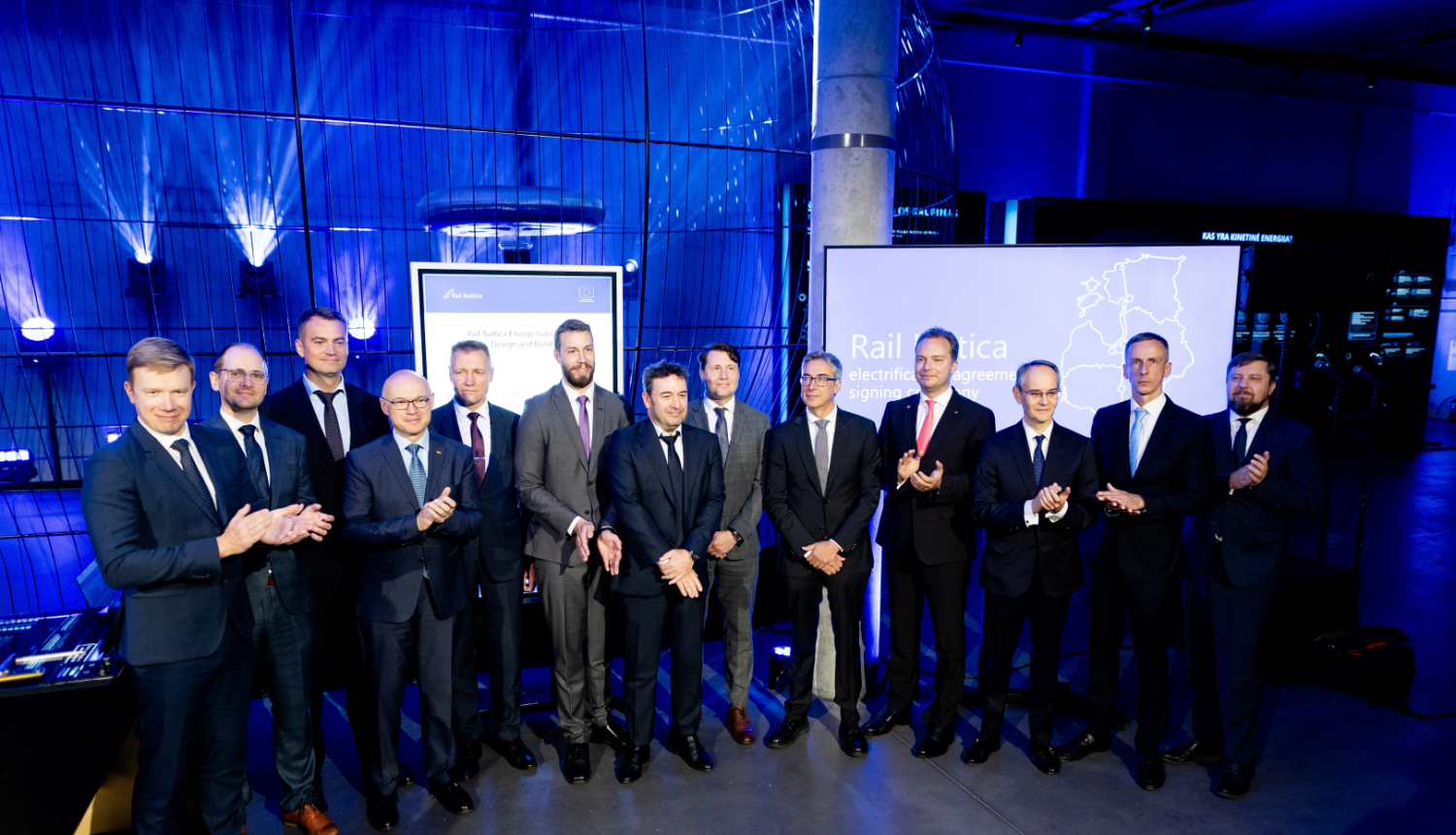On 15 September 2025, Vilnius hosted the ceremonial signing of the Rail Baltica electrification subsystem design and construction contract. The event brought together the management teams of the Rail Baltica delivery organizations, representatives from the three Baltic States’ ministries, industry partners, and the joint venture formed by Cobra and Elecnor, “COBELEC Rail Baltica”.
The contract, valued at EUR 1.77 billion (excluding VAT), has been awarded to COBELEC Rail Baltica – a consortium formed by the Spanish companies Cobra Instalaciones y Servicios S.A. and Elecnor Servicios y Proyectos S.A.U. It covers the full deployment of the Rail Baltica Energy (ENE) subsystem. The first phase, with a budget of EUR 949 million (excluding VAT), is scheduled for completion by 2030.
“Rail Baltica is more than just infrastructure – it is an economic and security link to the West. This contract is particularly important for our integration into the European railway network, enabling smooth passenger and freight transport while strengthening the resilience of the Baltic region. It is our strategic pathway to the future,” said Eugenijus Sabutis, Acting Minister of Transport and Communications of Lithuania.
Marko Kivila, CEO and Chairperson of the Management Board of RB Rail AS, underlined the project’s strategic importance: “Electrification is not only about powering trains - it is about enabling sustainable mobility, ensuring interoperability with the European network, and securing long-term energy efficiency for the entire region. At the same time, this is a highly complex agreement. To ensure that every necessary step is taken and the timeline remains aligned with the overall Rail Baltica development, the electrification works will be implemented in parallel with the wider project.”
“This agreement marks a historic milestone in Baltic cooperation and supports our transition to a more sustainable transport solution - one that will reduce long-term operating costs and contribute to climate change mitigation. Elecnor Servicios y Proyectos S.A.U. is currently electrifying the Vilnius–Klaipėda railway section, so the contractor is well-acquainted with working in Lithuania. This gives us confidence that the process will be smooth and efficient,” says Egidijus Lazauskas, CEO of LTG Group.
Jānis Naglis, Member of the Management Board of Eiropas Dzelzceļa līnijas said: “Rail Baltica electrification is one of the most complex and significant phases of the project, ensuring safe and efficient power supply along the entire Latvian corridor. It will bring tangible benefits for both passengers and the economy by reducing costs and emissions in the long term. Already in June this year, the Cabinet of Ministers approved the signing of a framework agreement with the consortium COBELEC Rail Baltica. That decision laid the foundation for today’s international contract, which strengthens Latvia’s role in the overall implementation of the project, with the first phase to be carried out using the allocated CEF funding.”
"At kilometer zero in Tallinn and Muuga, Rail Baltica begins. Electrification ensures that this starting point in Estonia is not only symbolic, but a real gateway connecting the Baltic region to Europe’s green economy," said Anvar Salomets, CEO of Rail Baltic Estonia.
Rail Baltica will electrify 870 km of railway and 2,403 km of tracks across Estonia, Latvia, and Lithuania, making it the largest railway electrification project in Europe and one of the largest worldwide. It will also pioneer the large-scale use of Static Frequency Converter (SFC) technology combined with 2x25kV in a 50 Hz system, powered by ten traction substations. This approach will ensure long-term reliability, efficiency, and strong environmental performance.
“The electrification contract is a major step for Rail Baltica. By selecting a single contractor for both design and construction, we ensure efficiency, consistency, and cost control. This approach allows us to cut life-cycle costs, improve energy efficiency, and deliver clear environmental benefits,” said Aiga Benfelde, Senior Contract Manager at RB Rail AS and Chairperson of the Procurement Commission.
Representatives of “COBELEC Rail Baltica” expressed the consortium’s commitment: “This contract marks a major milestone in Rail Baltica’s development, and we are proud to lead Europe’s largest railway electrification project. Cobra and Elecnor have a proven track record of delivering customised, high-quality solutions. Drawing on our combined expertise, we have a solid history of executing complex projects to the highest standards. We are committed to supporting Rail Baltica’s strategic role in strengthening regional connectivity and EU integration.”
The awarding of the contract followed a procurement process launched in May 2022. Four international consortia applied, with three shortlisted in 2023. The joint venture formed by Cobra and Elecnor was ultimately selected for its strong technical solution, cost efficiency, and sustainability credentials. This symbolic moment follows the electronic signing on 31 July 2025, which marked the formal launch of Europe’s largest railway electrification project.
Rail Baltica progress today
Rail Baltica has entered full-scale construction across Estonia, Latvia, and Lithuania, with mainline works, international stations, bridges, and crossings advancing rapidly.
In Estonia, more than 100 km of railway substructure is underway, including at the flagship Ülemiste Terminal.
In Latvia, priority is given to the southern section of the line, where large-scale construction works are underway near Iecava, complemented by progress on the 230 km framework agreement and major developments at the Riga Central Hub and Airport terminals.
In Lithuania, construction is progressing on the Kaunas–Panevėžys section, where 77 km of embankments and engineering structures are currently underway. By the end of 2025, works are expected to cover 114 km, including track-laying and the construction of a new bridge over the Neris River, which will be the longest in the country.
By the end of 2025, 43% of the Rail Baltica mainline will be construction-ready, marking a decisive leap toward Europe’s most ambitious cross-border rail project.



